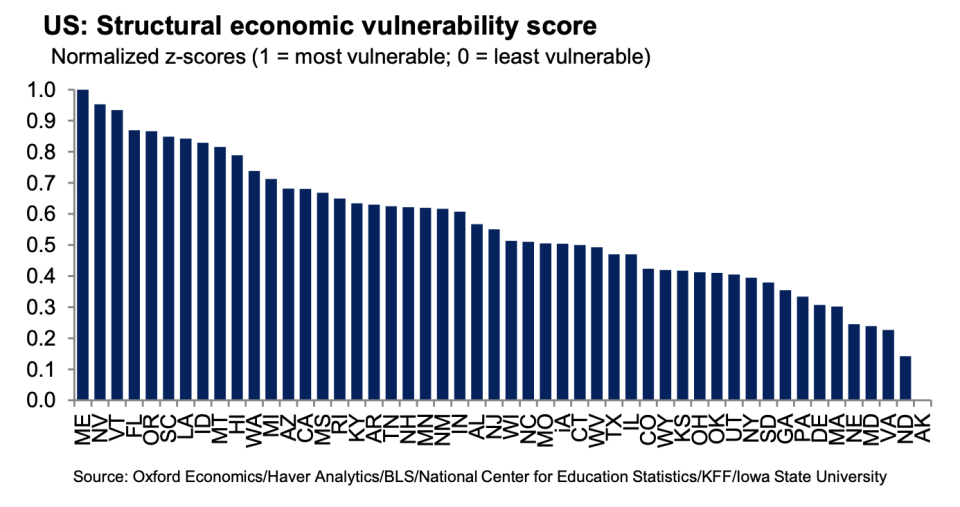3 U.S. states are more 'structurally vulnerable' to coronavirus than the rest
As the coronavirus outbreak and response continues, a new report reveals that Maine, Nevada, and Vermont are the most vulnerable states in America.
The report by Oxford Economics — which looked at 10 factors like trade openness, demographics, share of hospitality and tourism, retail, manufacturing, internet access, among other measures — found that among all 50 states, three states scored markedly higher in terms of structural vulnerability.

“A state like New York, which is currently the epicenter of the crisis, is actually less vulnerable to second-round hits in terms of economic activities,” Greg Daco, chief U.S. economist at Oxford Economics, told Yahoo Finance’s YFi PM. “But states like Florida, Maine, Vermont, and Nevada are highly susceptible to big drags on economic output and big employment losses because of this type of shock.”
The most vulnerable states “tend to have elderly populations … rely on retail activity … and have large number of small businesses,” the report stated.

Maine and Vermont both have, for instance, a large part of the populations are above the age of 65. The states also have a relatively large number of self-employed workers, as well as a lot more small businesses than others.
Nevada and Hawaii also rank high on the list, since 17% and 10% of their GDP respectively relies on the tourism industry.

Alaska most prepared for a shock
At the other end of the spectrum, states like Virginia, North Dakota, and particularly Alaska are more structurally sound to weather the economic impact of the coronavirus, the report found.
Alaska, for instance, doesn’t have a population that’s mostly above the age of 65 (only 11.8% as per the U.S. Census, compared to 19.4% in Vermont and 20.6% in Maine), no major exposure to retail and manufacturing, and is not likely to see tourism hit adversely by the virus.
And even states “with the highest incidence of coronavirus” will be relatively ok in the long run, like New York and Jersey, the report added.
But those states are not completely immune and have other vulnerabilities — such as a high exposure to global supply chains and their urban populations.
So the way they approach virus containment in the next few days and weeks “can amplify and reduce the risks from underlying vulnerabilities,” the report stated.
—
Aarthi is a reporter for Yahoo Finance. Follow her on Twitter @aarthiswami.
Read more:
2 U.S. cities are not prepared for a recession, Moody's finds
Coronavirus will likely hit these states hardest financially, according to Moody's
Public health expert: ‘Coronavirus is going to hit every city in America’
Read the latest financial and business news from Yahoo Finance
Follow Yahoo Finance on Twitter, Facebook, Instagram, Flipboard, SmartNews, LinkedIn,YouTube, and reddit.
